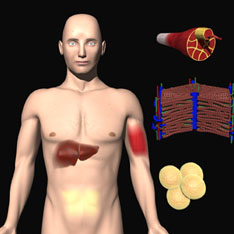Stem cells: miracle or mere deception?
 Utter fascination with stem cells has occupied the hearts and minds of scientists across the world.
Utter fascination with stem cells has occupied the hearts and minds of scientists across the world.

There is an overwhelming amount of various publications concerning various advances in the field of stem cell research. Internet along with numerous printed publications is overwhelmed with numerous advertisements of clinics promising total rejuvenation and effective treatment of potentially lethal diseases. Internet site of one of the clinics displays statistics of the overall effectiveness of the stem cell treatment. According to the ad, one can in fact be cured of such illnesses as bronchial asthma, strokes, Parkinson's disease… Can this be true??
Stem cells serve as the basis of the human organism, hence the name. During its early stages of development, a human embryo consists of undifferentiated stem cells. Afterwards, processes of differentiation are initiated and they eventually result in the formation of the organs and tissue. Amount of stem cells in an adult is significantly lower than in newborns. The cells are contained in small amounts in blood, bone marrow and in all organs and tissues of a human body. Since they are capable of transforming into all kinds of cells within our bodies, their role is crucial in rendering immediate assistance in case of an organ “malfunction”. Should something happen to one of the organs, these stem cells rush to the epicenter and work on reconstructing the organ’s function. The amount of stem cells tends to decrease with age. Consequently, the body's ability to recuperate becomes as one grows older.
By the time we are born, there exist more than 10 000 blood cells in the bone marrow per a single stem cell. Growing adolescents possess 10 times less stem cells. By the time a man is 50, there is a single stem cell per 0,5 million ordinary cells. This is why human's ability to regenerate tends to fade with age.
It's been almost a hundred years the scientists have become aware of the existence of stem cells. Back in the old days, Russian scientist Alexander Maksimov has come up with a theory of his own on this account. First scientific research works on the subject of stem cells date back to 1960-70s; they were written by two Soviet scientists Chertkov and Friedenstein. However, the subject didn’t gain worldwide popularity until late 90s, after “sensational” discovery of stem cells by Americans. They in turn managed to extract embryonic stem cells and prove their ability to turn into any other kind of cell. As soon as it was proven that human stem cells could be introduced to the organism artificially, this has resulted in a major sensation.
However, not everything remains clear in the sensational discovery. Head of laboratory of Hematological scientific center of the Russian Academy of Sciences, professor Joseph Chertkov states the following: “Unfortunately, almost all scientific works [concerning the aforementioned subject matter] result in other discoveries. Their authors are unable to provide clear explanation to a single question: which of the transplanted cells do adapt and which do not; also, why some adapt and some die…We need to conduct more serious fundamental research works, we need evidence, since there are way too many people these days who are simply trying to make money off of this subject.”
In the end of last year, Moscow’s medical academy of Sechenov hosted a “round table” discussion devoted to the subject of legality of stem cell participants. Participants focused on abundant quantity of various firms in Russia, that offer their services in stem cell therapy while possessing no legal licenses. Moscow, for instance, has several stem cell banks. However, only one of them has an official license of Russia's Health Ministry.
None of the scientists wishes to stop further experiments with stem cells. However, majority of them are certain that it would be unethical to use this technology for commercial purposes. After all, testing is still under way. More so, it is unethical to make any promises to the patients.
Overall, according to professor Andrei Akopyan: “People presume that money buys everything including health, appearance and even life… Today, there are no clear boundaries between medicine and business. People are saturated with sensations, they are offered stem cells and they are eager to pay for them."
Subscribe to Pravda.Ru Telegram channel, Facebook, RSS!


